APRIL, 2022 NEWSLETTER
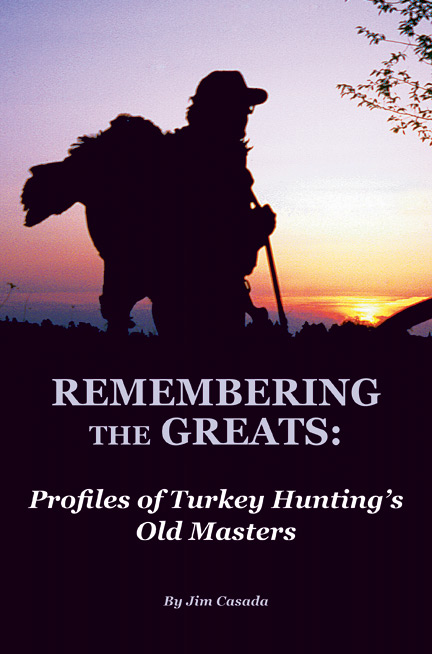
For the rest of April and the month of May only, in connection with spring turkey season, I’m offering three specials on books. (1) Copies of my award-winning book, Remembering the Greats: Profiles of Turkey Hunting’s Old Masters, which is hardbound with a dust jacket and extensive illustration, are only $25 postage paid.
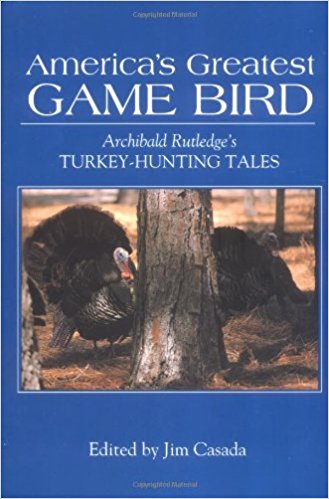
(2) Copies of another turkey book, this one that I edited and compiled, America’s Greatest Game Bird: Archibald Rutledge’s Great Turkey Hunting Tales, again hardbound with a dust jacket, are also $25 postage paid. (3) Take 20 percent off any book on my lengthy list of turkey hunting books (found on my website, www.jimcasadaoutdoors.com) priced below $100, and again, I’ll pay the postage. For these special offers, no PayPal please. They take too big a bite out of my financial hide. Checks, cashier’s checks, or money orders are fine (Jim Casada, 1250 Yorkdale Drive, Rock Hill, SC 29730).
ALL THOSE APRIL MEMORIES
In the admittedly rambling corridors of my memory, ones that are filled with wonder although some of them might be considered rather strange or even bizarre avenues of recollection, April activities from both long ago and more recently loom quite large. For this month’s I want to offer a random sampling of those fine memories.
*I’ll start with one that was unpleasant at the time but today merely evokes a wry smile when I think of it. April was the time for spring cleaning in more ways than one, and in the eyes of both Momma and Grandma Minnie part of that “cleaning” involved the inner body workings of a small boy. Both were firm believers in the benefits of spring tonics, and they weren’t satisfied with two or three doses of sassafras tea. Nothing short of a full bore sulfur and molasses treatment would do. The first time I can recall the subject matter being broached I actually was quite receptive. I loved the taste of molasses on a cathead biscuit or adorning a stack of pancakes (I enjoyed the latter for breakfast this morning), so I figured anything featuring molasses would be not merely acceptable but downright tasty. My was I wrong! No amount of blackstrap molasses can hide the noxious, nauseous, nasty, nerve-wracking taste of what was then known as flowers of sulfur.
*Grandpa Joe had what I considered a far better solution to the matter of cleansing one’s innards after a long winter a diet comprising far too little in the way of crucial vitamins such as A and C. He was a staunch advocate of a big bait of poke sallet. Properly prepared (see recipe below) it tasted wonderful and had a useful gustatory side effect as purgative. As Grandpa put it, “a good mess of poke sallet will set you free.”
*I liked poke and still do, but my fondest memory connected with the wild, Vitamin A-rich vegetable involves picking it to sell. My second grade teacher would pay a quarter for a poke of poke (for those whose Appalachian vocabulary might not be fully up to speed, a poke is a paper bag). That was big money for a little boy in the middle of the last century. At that point in time I didn’t even receive an allowance, and when I did begin to get one a few years later it was the same amount—two bits. For the few weeks poke could be harvested I was in high cotton, so to speak, and I knew the whereabouts of every poke plant within a half mile radius of home.
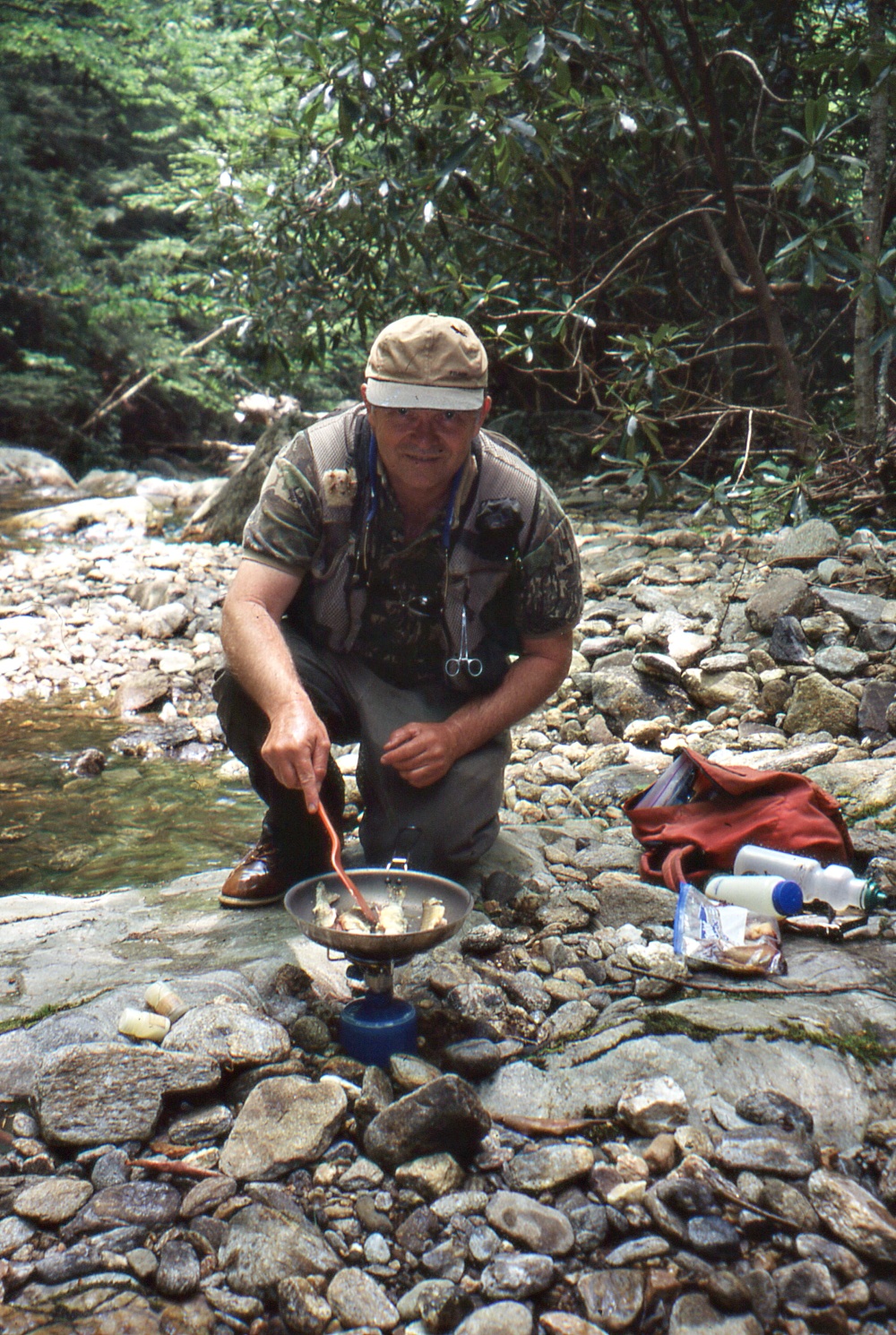
*The opening of trout season. In yesterday’s world of fishing for trout in the North Carolina mountains where I grew up, many streams, including all of those in the Great Smoky Mountains National Park, were closed through winter months and didn’t open until April or even early May. That has to a considerable degree changed today (Park streams are open throughout the year), but opening day was a big deal in my youth. It meant, often as not, bitter temperatures, and wading wet was often pure misery. Yet you went anyway—it was a time-honored ritual—and that first backcountry camping trip of the season was always a joy to a boy. So was that first mess of trout (again, see recipe below) fresh from the creek.
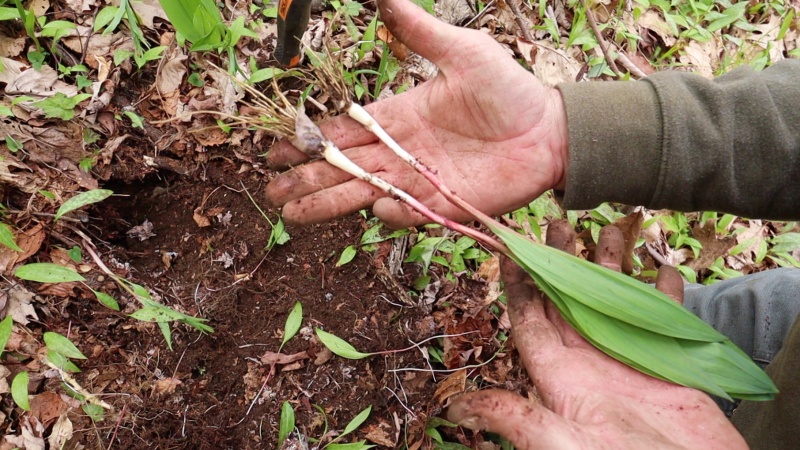
*Eating a mess of ramps has long been of importance to folks in the higher elevation portions of the Southern Appalachians. That wild member of the leek family has an olfactory after-effect of tsunami proportions; so much so it will clear a closed room of people. Anyone who came to school when I was a kid after having eaten raw ramps would be sent home for three days. You simply couldn’t stay in the building with such a person. However, cook ramps and they lose that after effect (see recipe) . Likewise, once you’ve eaten them you no longer notice the smell. The obvious solution on springtime camping trips was “one eats; all eat.” You had no choice, and besides, a fresh wild salad featuring ramps and branch lettuce “kilt” with a dressing of hot bacon grease or the renderings from a bit of fried streaked meat was a gustatory gift from the culinary gods.
*Wildflowers. May sees wildflowers reach their blooming peak in my part of the world, but they get a running start in April after March harbingers of what is to come in the form of service trees abloom, pussy willow buds a-bursting, the first hints of gold on the aptly name yellow bells (forsythia), and dainty bluets and violets. Daffodils lead the April parade, amply supported by redbuds, dogwoods, and much more. I’ve always loved the flowers of spring and it’s as if Mother Nature gets decked out in all her finery and frills to celebrate not just Easter but the weeks before and after.
*Weather. While grand literary figures beginning with Geoffrey Chaucer’s “When the sweet showers of April have pierced the drought of March,” have given us thoughts such as “Oh to be in England, now that April’s there” (Robert Browning), “April is the cruelest month” (T. S. Eliot), and many more, I particularly like one of the many thoughts Shakespeare offered when referring to what most scholars consider his favorite month: “April hath put a spirit of youth in everything.”
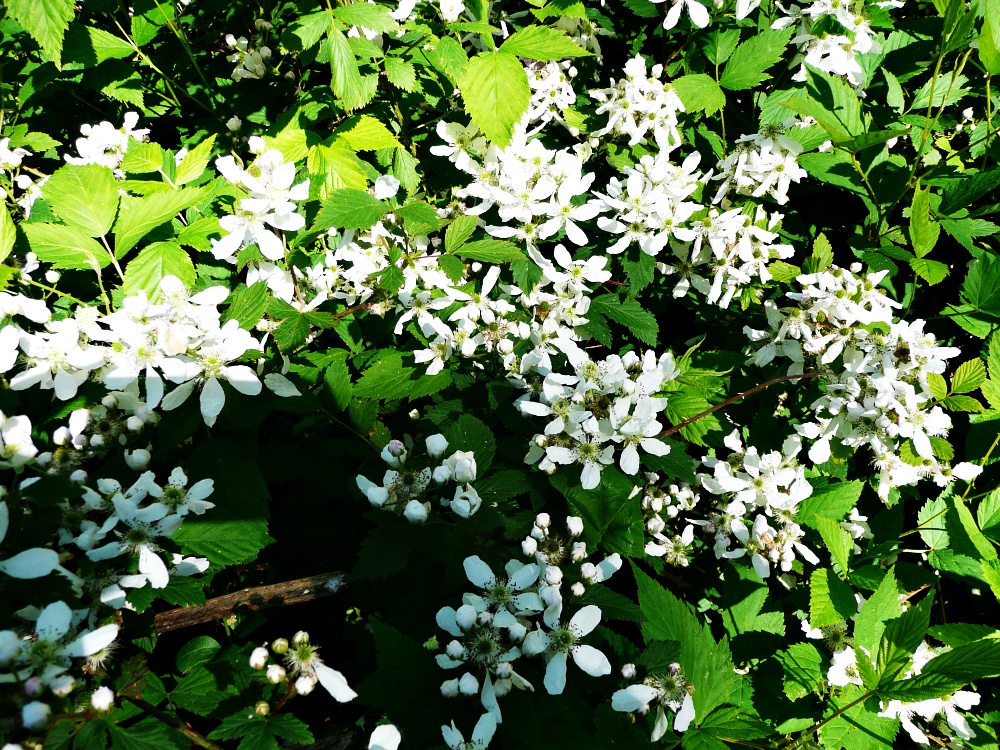
It does indeed put pep in an old man’s step, sets everything wearing feathers into a procreative mood, and even with showers and periods of what can only be called nasty weather is a time of delight. Yet April is also the month with the last vestiges of winter—redbud winter, dogwood winter, catbird squall, longhandles farewell, and blackberry winter. All of these except the longhandles description I heard regularly throughout my youth and beyond. As for the longhandles, I encountered that when talking with locals while on turkey hunts in the Midwest, and the symbolism was that with a final April cold snap you could put away your union suit until late fall. All the others referred to cold snaps that seemed to occur in connection with redbud, dogwood, or blackberries blooming or the arrival of catbirds for the season. This year, all have come and gone except blackberry winter, and just a week ago we had a cold snap (with frost) even as blackberries began to signal their whereabouts and promise of future bounty with lovely white blooms.
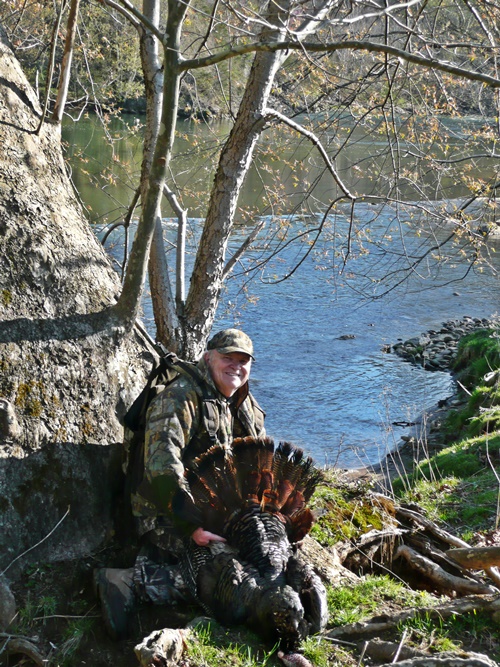
*Turkey hunting. Turkeys were not a part of my youth—there were none to be hunted where I grew up and I never so much as saw one until I was well into adulthood. That changed, and changed dramatically, once I was introduced to the grand bird. Alas, I fear I’ve seen the golden age of turkey hunting come and go. In the 1980s, 1990s, and even for the first few years of the 21st century bird numbers were plentiful. Then came a slow, seemingly inexorable decline (wildlife biologists hem and haw and conduct their studies, but my “studied” opinion is that right now they don’t really have much more of a clue than I do—and I’m clueless). On top of that, the National Wild Turkey Federation has in some senses created a monster. There are far more hunters than public land can support in most areas, and that’s certainly the case here in South Carolina. I won’t even go on public land—I consider it that unsafe.
As for the turkey decline, it’s ongoing and I see no end in sight. At this juncture, on a personal level, I haven’t so much as heard a single gobble, much less worked a bird. Mind you, I don’t get around like I once did, and my access to hunting land is limited. But the bottom line is that in my turkey world, and I hear similar tales of woe from many others, the grand turkey bubble of yesteryear has burst.
That’s enough for this month, good (mostly) and bad. It’s always useful to keep a bit of balance and perspective in one’s life, no matter what the month. With that in mind let’s turn to a bit of humor—or at least I hope you’ll find it funny. Certainly the tale I’m about to share has always evoked mirth in my family.
LAUGHTER IS WELCOME AT ANY SEASON
My immediate family was medium-sized. I have a sister and a brother. But during the holiday season, both when I was a youngster and well on into my adult years, things could get a bit hectic what with spouses, assorted aunts and uncles, my daughter, and the children of my brother and his wife. What follows, and I think it possible it occurred in May although the time of year really doesn’t matter, focuses on his wife and the youngest of their three boys, Will.
Susan, my brother’s wife, was soft spoken and likely, in her early years of marriage, a bit overwhelmed by our boisterous family. In time she overcame that, mostly through her own strength of character and probably with a bit of Mom’s influence. Momma was one of those souls who just exuded goodness, “enjoyed” more than her fair share of simple jokes at her expense, and was endlessly plagued by other family members teasing her. Just today, for example, I was munching on some pistachios as a snack, and they brought back memories of a fine example. She made a pistachio cake that was absolutely delicious, but proper pronunciation of the nut absolutely her. Momma tried valiantly for a long time and finally gave up the ghost, simply saying, “that green cake.”
Hers was an outlook on life that exuded joy, found delight in the simplest of things, and she somehow had a magic about her that shone through brightly any time she sensed so much as a hint of distress in family or indeed anyone around her. That’s doubtless one reason her grandchildren absolutely adored her. But she was also a marvel when it came to interaction with Susan and my late wife, Ann, and without having any factual “proof,” I feel perfectly confident in saying she eased the path for both of them as they acclimated to difficult husbands and a family that might have seemed, to any outsider, as somewhere on the edge of constant insanity when they all got together.
That’s just background information or a sidelight to the story I want to share. At some point after Don and Susan had been married for a good many years (they had three boys although their youngest child, a girl, had not yet appeared on the scene), I visited them while I was in the area where they lived on a research trip. Their home was out in the country and when I arrived only their youngest, Will, showed up to greet me.
He immediately welcomed me with what I thought a bit strange and involved what I mistakenly construed as begging. “Uncle Jim,” he asked, “have you got a peeny” (that’s the way he pronounced it). I dug around in my pockets and produced some change, but while I had nickels, dimes, and a quarter, there was no penny to be had. I told him I didn’t have a penny and offered him some other change, but instead of accepting it he became obviously agitated and again asked, “Where’s your peeny?”
At that juncture Susan arrived on the scene and immediately blushed a lovely rose tint that suffused her entire face. Then she had to explain Will’s agitation to me. He wasn’t inquiring about pocket change; instead, he was interested in the presence (or lack thereof) of a key portion of the male anatomy. Don and Susan apparently had taught him to call his penis a peeny, and as anyone who has spent much time around little boys readily realizes, at bathtub time, the latter stages of potty training, and on other occasions, that organ is the focus of overweening interest. Of course I reckon you could make a point that doesn’t stop with the early stages of boyhood, but I’m not going one word further down that trail to a deep rabbit hole.
Will was deeply concerned for my apparent lack of a vital piece of equipment, and my digging around in close proximity while searching each of my pockets certainly didn’t help matters. In his eyes there was no peeny to be found and he was in a state of abject dismay for the status of his poor Uncle Jim. Once I got the whole thing straight I’m sure my reaction added to mortification, because I laughed uncontrollably with tears rolling down my cheeks. Predictably, the whole scenario was repeated numerous times in large family gatherings. For my part, I blame Don. He surely must have been the one responsible for changing a perfectly acceptable word, penis, to “peeny” (which doesn’t in my view ease things one iota in polite and proper company). Whoever was responsible, I still get several moments of delight every time I think about a befuddled and concerned little boy, his obsession with an uncle who apparently had some real problems with his anatomical structure, and a mother who was terribly embarrassed.
JIM’S DOIN’S
I’ve been quite pleased with the response of my listing of a decades-long accumulation of hundreds of turkey calls for sale. Scores have been purchased but there are many more that remain available. If you are interested, just drop me an e-mail (jimcasada@comporium.net) and I’ll send you a fully up to date list.
No small amount of my time in recent weeks has seen me, as is my lifelong wont, tilting at windmills or, to turn from Don Quixote and phrase it in terms I sometimes heard as a youngster, trying to catch a dust devil. Exercises in the impossible or near impossible may be considered by others a waste of time, but for my part I’ll always, albeit selectively, fight such battles. Doing so lets me be at peace with my inner self. Sometimes, it seems, it is necessary to make a little noise if you want to be heard. I realize that some of my recent irritants won’t mean much to most of you, but I’ll share the essence of some simply because I strongly suspect you have similar headaches in your daily life. If you do, I would suggest addressing them in strident but polite fashion. I’m convinced that’s far better than keep vexation all cooped up insider your mind.
*Recently, out of the blue, the local daily newspaper, The Herald, a publication I faithfully served as outdoor columnist for almost four decades, sent me a most unwelcome notice. It stated that they were, effective May 9, “implementing a minor weekly charge.” Guess who is getting the charge? Worse, like every other subscriber, I was given no choice. The newspaper’s bigwigs are going to implement the $.39 per week charge by shortening my pre-paid subscription through deducting the agreed upon time I paid for a subscription. The amount isn’t the issue—it’s the dictatorial “we are doing this whether you like it or not” attitude. It may be illegal, it’s certainly wrong, sort of like buying a car or an appliance, paying for it, then subsequently getting a notice you were going to have to pay some more. The notice said “no action is required” in bold letters, but I’ve taken action. I’ve filed a formal complaint with the Better Business Bureau (BBB), commented on the matter on every on-line ratings list I can find (on some of them I’m at the end of a long, long line of others who are vexed on one issue or another with The Herald, most of them connected with the quality of the newspaper and poor service), and made repeated calls. Interestingly, and it’s a sad commentary on our world, the only real, live human beings I’ve reached for actual conversation work in a call center and most assuredly don’t have English as their first language. All they can do is say “I’m sorry” and read from some kind of prepared script. I might add that at this juncture they haven’t responded satisfactorily to the BBB either.
*Then there is the seemingly endless quest of the Great Smoky Mountains National Park for dollars. The current Park superintendant has a singularly fitting name, Cassius Cash (I’m not kidding)—as in “Yon Cassius hath a lean and hungry look,” and rest assured that look is for cash. His latest proposal is to charge anyone visiting the Park $5 dollars a day to park—anywhere, and for any amount of time. There will be a $40 annual pass but for many families where I grew up, which is a poverty-stricken area, that’s real money. What is particularly onerous is that there are numerous cemeteries that can only be reached by parking, old home places where loved ones once resided that necessitate parking for access (my father’s boyhood home falls into that category), every fisherman will have to pony up, all hikers better dig in their billfolds, and what adds to the overall onerous nature of the proposal is lands you have to pay to visit were in many, many cases taken by eminent domain. Then there’s a nod to—well a nod to something, I’m not sure exactly what—in that tribal members of the Eastern Band of the Cherokee Indians, who did not directly contribute a single acre to the Park, have been given a pass. It’s bureaucratic bungling at its most brazen, and I’m doing my tiny part, ineffectual though it will unquestionably be, to expose the sham. Predictably, I might note, most of those in favor of this are outlanders or folks with no family, historical, or emotional ties to the Great Smoky Mountains National Park. On the other hand, those with deep local roots for the most part have reactions ranging from keen disappointment to being absolutely furious. Insofar as I can ascertain, Supt. Cash doesn’t give a fig about our views. He didn’t even have the guts to appear before the public or hold public hearings; instead, there was a sham of a Zoom-type Internet presentation.
*Of course there’s the never-ending irritant of lousy service—in most any industry. Add to that indifferent workers who have no sense of pride in their work, the inability to reach anyone when you make phone calls to the numbers listed for customer assistance, a great many shoddy products, a national work ethic that seems to be vanishing like pollen (yeah, that’s another irritant) in the face of a spring shower, and you get my drift. The “good old days” were really good in terms of how things worked and how people were willing to work. I’m sorry but I simply can’t have and never will have empathy for perfectly healthy and capable folks who are unwilling to work. On the flip side of things though, I applaud, and do so enthusiastically, the folks who are and always have been the backbone of this country—blue collar workers. It’s the repair men, machinists, delivery folks, plumbers, builders, painters, roofers, mechanics, and the like who make America run. Sadly, they seem to be in ever shorter supply, while far too many college graduates (and remember, I was a university professor) are pretty much lost when it comes to practical things in life.
That’s enough fuss and bluster, but I will make one final point before closing. I’ve always been one to speak my mind when something seemed wrong to me, and the words from a fine country song, “you’ve got to stand for something or you’ll fall for anything” seem to me mighty fitting. I do stand up and speak out when something seems wrong to me, and right now, sadly, I’m afraid there’s an awful lot wrong in our world. Maybe I’m just out of sorts or crotchety, but to me matters in our society and on the national scene are currently of greater concern that at any point in my lifetime. Still, I’m determined to keep on the sunny side, and maybe the recipes shared below will make things look a bit brighter.
************************************************************************************
RECIPES
FRIED TROUT
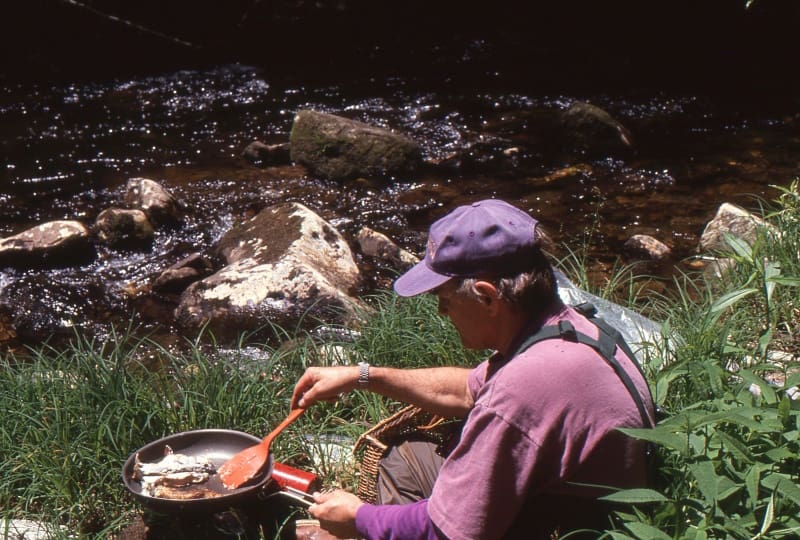
No meals, and no particular foodstuff from my youth and beyond holds greater meaning to me that fried trout I had caught in the pure waters of my native Smokies. They graced the table in our home with some regularity and Momma was a plain fool for fish. But the finest trout I’ve ever eaten were those in backcountry campsites within easy hearing distance of the creek where they had been
swimming only an hour or two before.
2 to 3 small trout (6 to 8 inches length is ideal—they are tastier than larger ones) per person, dressed
Stone-ground cornmeal
Salt and pepper
Bacon grease or lard
Clean the fish and leave damp so they will hold plenty of corn meal. Put your cornmeal in a Zip-lok bag, add the trout, along with salt and pepper, and shake thoroughly. Make sure the inside body cavity gets a coating of corn meal. Cook strips of bacon or streaked meat and save grease, setting the meat aside to mix with a green salad or to crumble into fried potatoes. Place the trout in a large frying pan (a cast-iron spider works wonders but modern non-stick kitchen ware is quite suitable) holding piping hot grease. Cook, turning only once, until golden brown. You can help the process along by using a spatula or tilting the pan a bit to splash grease into the open body cavities. Place cooked fish atop paper towels, pat gently to remove any excess grease, and dig in. If it is springtime, serve with a backwoods “kilt” salad (branch lettuce, ramps, and bacon bits with leftover hot cooking grease poured over it for a dressing), fried potatoes and onions with bacon bits added, and something for the sweet tooth to finish.
A BAIT OF RAMPS
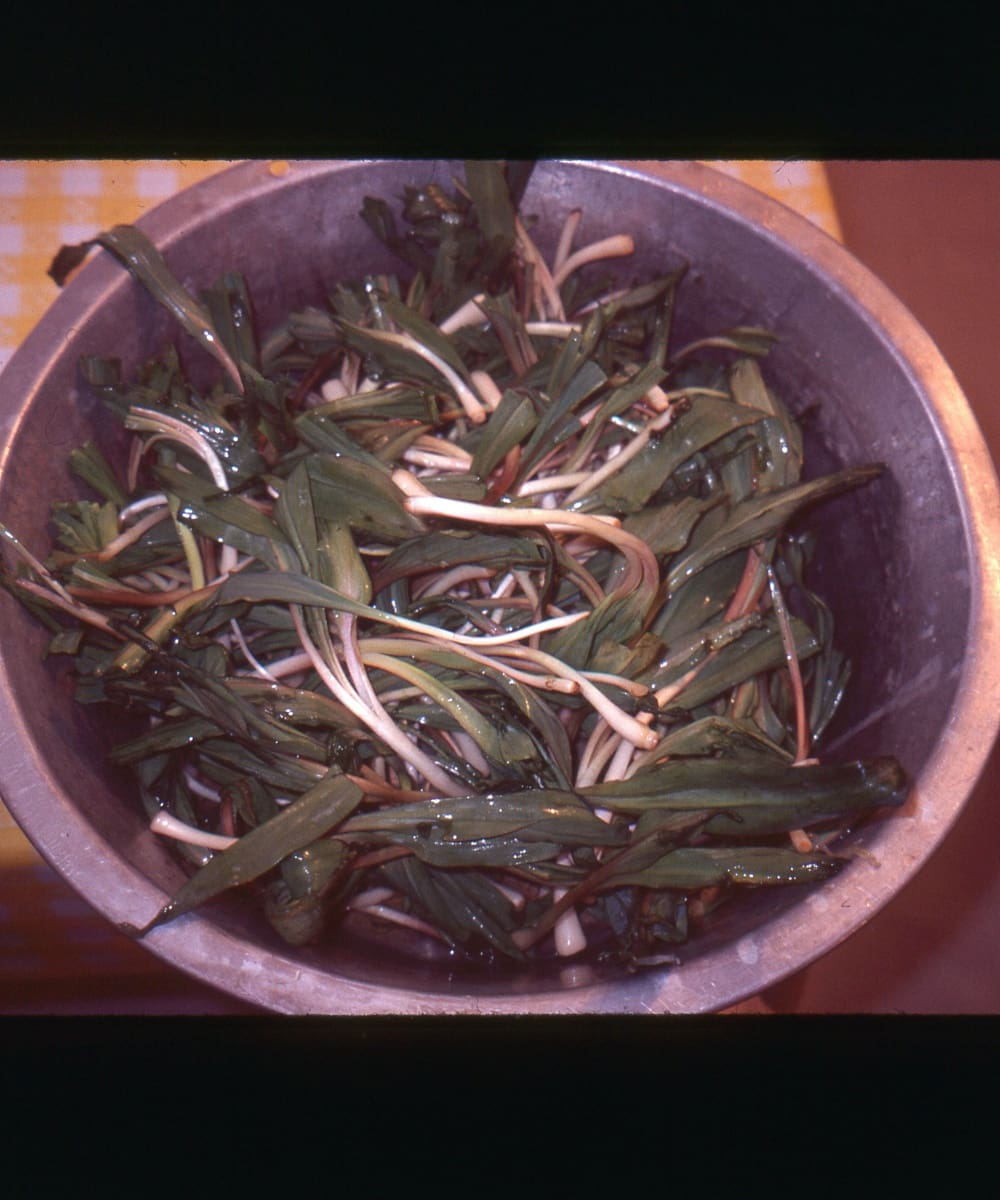
As the previous recipe notes, trout prepared in a backcountry campsite were often served with ramps as a side dish. There are many ways to prepare ramps, but a “kilt” salad of raw ones cut up with branch lettuce and dressed with hot grease was almost de rigueur in the opening period of trout season. Besides, if someone in the party ate them, everyone had to—in self-defense. For present purposes though, let’s take the approach that renders this high priestess of halitosis impotent while remaining tasty indeed; namely sautéed or fried ramps.
Gather and clean 8 to 12 ramps for each person to be served. Sauté in butter or bacon grease until translucent. Serve piping hot as a side dish with trout or chicken and maybe a heaping helping of fried potatoes.
POKE SALLET WITH BOILED EGGS
The prime period for gathering poke has already come and gone—it is a vegetable of early spring—but maybe you can make do with some top leaves from still growing stalks or, if you live in a more northerly or higher elevation situation that I do, get the tender sprouts. Alternatively, file away the thought (and recipe) for next spring.
The way both Momma and Grandma Minnie prepared poke was pretty much the standard approach throughout the Smokies. They rinsed freshly gathered sprouts thoroughly in a colander to remove dirt and insects and then brought the shoots to a rolling boil in a sizeable pot of water. Once the water had boiled for several minutes, they would remove the pot from the stove and drain it. The process was then repeated, starting with cold water and again draining the greens after they had boiled for 10-15 minutes. I have subsequently learned that the plant contains so much Vitamin A that this approach is necessary to remove the excess of that vitamin.
The third time around a couple of slices of streaked meat or maybe bacon drippings would be added to the pot and the greens would be simmered slowly in their own juice while pork worked its wonders. At the conclusion of this process you had poke sallet ready for table use. Usually slices of boiled eggs topped the greens, and sometimes bits of bacon or crumbles of crisp-fried streaked meat would be added as well.